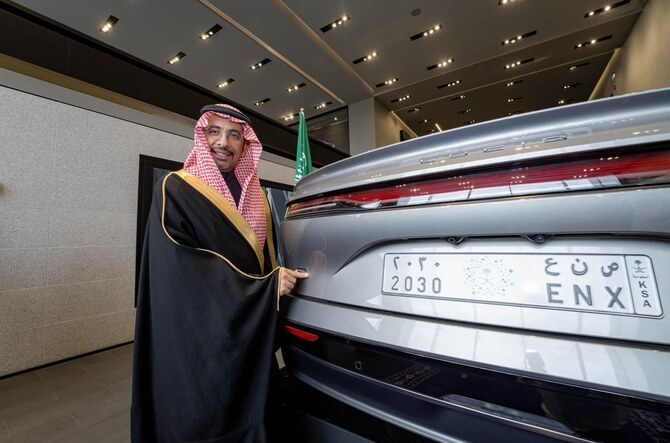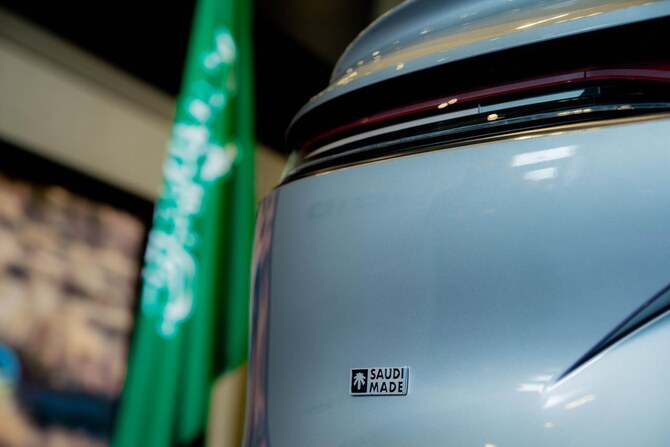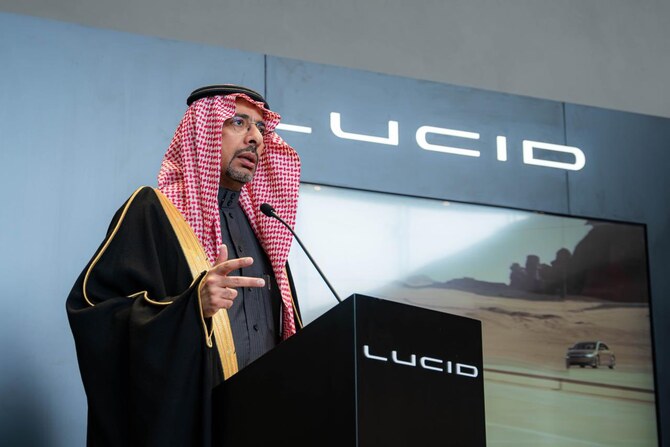RIYADH: Electric vehicle manufacturer Lucid Motors has become the first global automotive company to join the Kingdom’s “Made in Saudi” program as the country continues strengthening its industrial capabilities.
The milestone grants Lucid the right to use the “Saudi Made” label on its products, symbolizing the nation’s focus on quality and innovation.
The strategy aims to increase the industrial sector’s contribution to the gross domestic product to at least 20 percent by 2025, tripling the current industrial base.
It also seeks to attract additional investments, enhance non-oil exports, and create sustainable job opportunities, aligning with Vision 2030’s economic diversification goal.
“This is a step that represents a strong push to enhance the image of the national industry and attract investments and global companies, which consolidates the Kingdom’s position as a global center for innovative manufacturing,” Minister of Industry and Mineral Resources Bandar Alkhorayef said in a post on his X account.
In a separate statement, the minister said that Lucid Motors’ inclusion in the program underscores Saudi Arabia’s strategic transformation toward creating a fully integrated electric vehicle manufacturing ecosystem.
The minister added that this initiative aligns with the objectives of the National Industrial Strategy, which focuses on empowering promising sectors and attracting high-value investments in advanced industries.
Lucid’s participation in the program follows the launch of its first international manufacturing plant in Saudi Arabia in September 2023.
Located in King Abdullah Economic City, the facility is the Kingdom’s first-ever car manufacturing plant and represents a key milestone in its efforts to build a domestic automotive industry.
The facility can currently assemble 5,000 Lucid vehicles annually during its first phase. Once fully operational, the complete manufacturing plant, including the assembly line, is expected to produce up to 155,000 electric cars per year.
Saudi Arabia is aggressively promoting the adoption of electric vehicles as part of its Vision 2030 strategy, which aims to achieve net-zero carbon emissions by 2060.
A critical target of the initiative is for 30 percent of all vehicles in Riyadh to be electric by 2030, contributing to a broader goal of reducing emissions in the capital by 50 percent.
To support the transition, the Public Investment Fund — a major backer of Lucid Motors — has been instrumental in establishing a domestic EV manufacturing sector.
In addition to its stake in Lucid Motors, PIF has launched Ceer, the Kingdom’s first locally branded electric vehicle manufacturer, as part of its efforts to bolster the industry.
Infrastructure development is also a core focus, with the Kingdom planning to deploy 5,000 fast chargers across Saudi Arabia by 2030 to facilitate the adoption of EVs.
Consumer interest in EVs is steadily growing, with over 40 percent of Saudi consumers considering purchasing an electric vehicle within the next three years, according to a 2024 report by London-based professional services network PwC.
Faisal Sultan, vice president and managing director for the Middle East at Lucid Motors, expressed the company’s pride in joining the program, saying: “We are delighted to join the ‘Made in Saudi’ program and have the honor of using the ‘Saudi Made’ label, which represents quality and excellence.”
He added: “We are committed to embodying the values of this national identity, such as sustainability, innovation, and excellence. With the increasing focus on electric vehicles in the Kingdom, we aim to deliver an advanced and unique experience to our customers.”
The minister said that Saudi Arabia has emerged as a central hub for electric vehicle production, supported by modern infrastructure, incentivizing policies, and a highly skilled workforce.
He also said that major players like Lucid Motors strengthen the Kingdom’s position as a global center for future-focused industries while contributing to increased local content, non-oil exports, industrial localization, and knowledge transfer.
Launched in March 2021, Saudi Arabia’s Made in Saudi program promotes domestic products and services, encouraging local consumption and boosting non-oil exports.
The move aligns with Saudi Arabia’s broader industrial strategy, which aims to increase the sector’s gross domestic product contribution to 20 percent by 2025 and drive investments in advanced industries.
It also supports Vision 2030’s goal of reducing the nation’s reliance on oil by fostering high-value sectors like electric vehicle manufacturing.

































